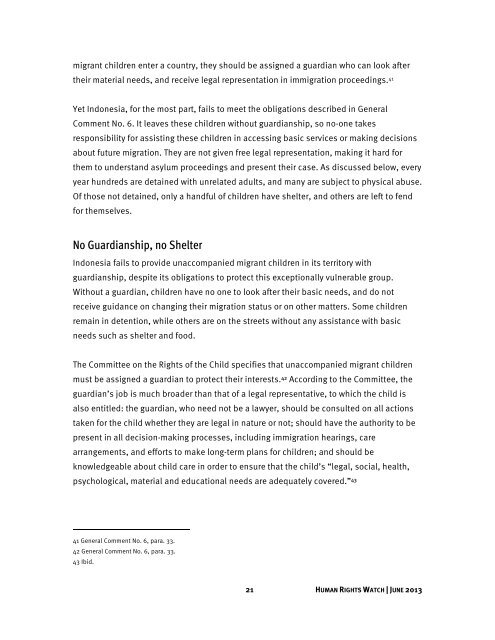Download the full report - Human Rights Watch
Download the full report - Human Rights Watch
Download the full report - Human Rights Watch
Create successful ePaper yourself
Turn your PDF publications into a flip-book with our unique Google optimized e-Paper software.
migrant children enter a country, <strong>the</strong>y should be assigned a guardian who can look after<br />
<strong>the</strong>ir material needs, and receive legal representation in immigration proceedings. 41<br />
Yet Indonesia, for <strong>the</strong> most part, fails to meet <strong>the</strong> obligations described in General<br />
Comment No. 6. It leaves <strong>the</strong>se children without guardianship, so no-one takes<br />
responsibility for assisting <strong>the</strong>se children in accessing basic services or making decisions<br />
about future migration. They are not given free legal representation, making it hard for<br />
<strong>the</strong>m to understand asylum proceedings and present <strong>the</strong>ir case. As discussed below, every<br />
year hundreds are detained with unrelated adults, and many are subject to physical abuse.<br />
Of those not detained, only a handful of children have shelter, and o<strong>the</strong>rs are left to fend<br />
for <strong>the</strong>mselves.<br />
No Guardianship, no Shelter<br />
Indonesia fails to provide unaccompanied migrant children in its territory with<br />
guardianship, despite its obligations to protect this exceptionally vulnerable group.<br />
Without a guardian, children have no one to look after <strong>the</strong>ir basic needs, and do not<br />
receive guidance on changing <strong>the</strong>ir migration status or on o<strong>the</strong>r matters. Some children<br />
remain in detention, while o<strong>the</strong>rs are on <strong>the</strong> streets without any assistance with basic<br />
needs such as shelter and food.<br />
The Committee on <strong>the</strong> <strong>Rights</strong> of <strong>the</strong> Child specifies that unaccompanied migrant children<br />
must be assigned a guardian to protect <strong>the</strong>ir interests. 42 According to <strong>the</strong> Committee, <strong>the</strong><br />
guardian’s job is much broader than that of a legal representative, to which <strong>the</strong> child is<br />
also entitled: <strong>the</strong> guardian, who need not be a lawyer, should be consulted on all actions<br />
taken for <strong>the</strong> child whe<strong>the</strong>r <strong>the</strong>y are legal in nature or not; should have <strong>the</strong> authority to be<br />
present in all decision-making processes, including immigration hearings, care<br />
arrangements, and efforts to make long-term plans for children; and should be<br />
knowledgeable about child care in order to ensure that <strong>the</strong> child’s “legal, social, health,<br />
psychological, material and educational needs are adequately covered.” 43<br />
41 General Comment No. 6, para. 33.<br />
42 General Comment No. 6, para. 33.<br />
43 Ibid.<br />
21 HUMAN RIGHTS WATCH | JUNE 2013
















